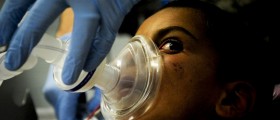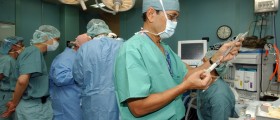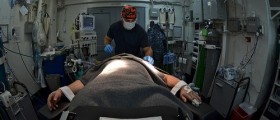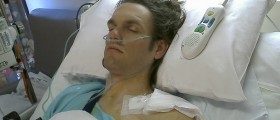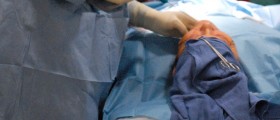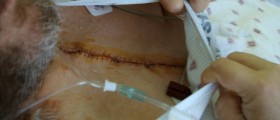Loading...
Loading...
Loading...
Loading...
Loading...
Within seconds I was writhing in agony, and he stopped. He asked me if I wanted him to proceed.
Now, I'm not sure what my pain threshold is compared to others, but earlier this week I was in a dentist chair for 3 hours getting a root canal. Painful and uncomfortable? Of course. But nothing compared to the few seconds the scope was inserted. It was un-freaking-bearable.
I asked him how much more there was, and he responded "We haven't even come to the prostate and that's where it gets 'serious'.
I told him I couldn't stand it and he withdrew the scope. There was a LOT of blood. I continued to bleed for a couple of hours. It was as if I was peeing blood. Starting a urine stream was intensely painful and it burned. I guess the blood clot(s) that formed inside had to break free each time I peed.
I had a similar bleeding experience with a prostate biopsy, but this was worse.
By the end of the day I was only seeing a small spot of blood when I started the stream.
The urologist is going to schedule the procedure under general anesthetic, but I am frankly dreading the post-op experience.
The urologist didn't seem too surprised that I stopped him, and told me that some people are just very sensitive in that area. Some people? I'd really like to see the statistics on that.
I'm also wondering if it's possible that I had a problem with the lidocaine. The reason I mention this is that when I was getting numbed before the injection for the root canal, the dentist mentioned to his hygienist that he saw a reaction, and pointed it out to her. He didn't say anything to me, and the anesthetic did numb my gum, so I wasn't too concerned about it.
But I intend to call the dentist office first thing Monday to get more details on the 'reaction'.
I read that a possible side effect of lidocaine is swelling. If that's the case, imagine the damage that can be done trying to slide the scope into a swollen urethra.
Loading...
Loading...
Just a suggestion from a patient who also underwent an excruciating cystoscopy some three years ago.
1. Tell the doctor or nurse to be careful with the disinfectant. If it gets inside the urethra it can sting or burn (it did for me). If you have any chafing, it can sting or burn too.
2. Tell the doctor or nurse to anesthetize the urethral meatus (pee hole) first and just inside the urethra. It'll sting for a few moments. Then when he/she sticks the needleless syringe in to inject the anesthetic gel for the rest of your urethra it won't freaking hurt as much.
3. When he/she injects the gel, it will sting/burn. Relax. The numbing follows within 5 minutes. All locals feel cold or burn before they numb. Everyone's a little different which is why some men find it quite painful and others don't.
4. When he or she starts the procedure, you should feel pressure and minimal pain. (Locals don't numb pressure nerve sensors usually.)
5. The worst part of a cystoscopy for men is when the cystoscope passes through the membranous urethra (that's the part just before the prostate gland) and through the bladder sphincter (you're used to something passing out of the sphincter not into it so it feels strange and unpleasant; if you clench your urinary sphincter it hurts even worse; just relax, breathe deeply and bear down a little like you're going to pee; it'll open the sphincter and you won't have an accident because the cystoscope blocks the path; besides they're medical professionals and they know people pee; they do it themselves!)
6. They're going to fill your bladder with sterile saline or sterile distilled water (usually saline). It's room temperature and not the nice warm temperature of your urine (around 100 deg F or ~40 degrees C); it doesn't hurt or cramp. It just feels weird. Just relax. The bladder fills rapidly and the doc takes a look around.
7. They remove the cystoscope smoothly. It feels a little like peeing. It's actually a relief.
It's usually less than 5 minutes. They don't need to linger unless they do a biopsy in the bladder or find stones. The whole thing is videoed and digitally stored. The urologist can review it at different speeds before your after-procedure consult. Generally an experienced urologist knows when something looks abnormal in that short a time.
Bottom line: Don't let the doctor rush through the procedure. Let the anesthetic take effect. Do NOT hesitate to tell the doctor that you do not consent to the process being painful nor rushed, you expect to be REASONABLY comfortable. The median pain score is 3.8 on the 0-10 scale. That means half of male patients experience no to mild pain while 50% experience mild to severe pain.
Most male patients report the worst pain site is at or just past the meatus (pee hole) and the membranous urethra. Some men have more sensitive or enervated urethras than others. Lidocaine does work to numb these areas.
Health care law in most jurisdictions allow patients to withdraw consent at any time. If the procedure is too much for you to handle, then state clearly, "I withdraw my consent to the procedure. Withdraw the instrument and leave the room." Screaming is not a withdrawal of consent. You must state that you do not consent to the procedure any further. The doctor MUST respect the withdrawal or be subjected to assault and sexual assault charges.
Doctors may only do things to you without express consent when (a) you are unconscious (implied consent if life saving or medically necessary); (b) you are a danger to yourself or others (such as involuntary committal to a facility for observation).
It's your body. They're your genitals. You decide what the boundaries are. Many men who have experienced agonizing cystoscopies end up traumatized by the experience. NO doctor has the right to do that to you. This isn't "man up" or "suck it up". Your body. Your choice. Your consent. Remember that.
Loading...
Loading...
Loading...
Loading...
Loading...
I you have a PPO and can chose your own physician(s) your insurance may also include general anesthesia in a hospital.
Loading...




